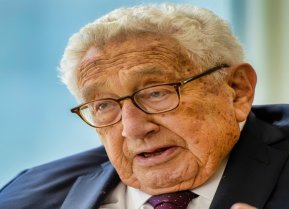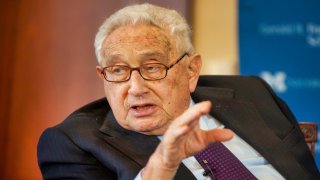The Office That Henry Kissinger Built
Every American has Dr. Henry Kissinger to thank for helping to shape a more peaceful world. Every National Security Adviser who served after Kissinger has him to thank for skillfully securing their office close to the president in the West Wing of the White House.
Every American has Dr. Henry Kissinger to thank for helping to shape a more peaceful world. Every National Security Adviser who served after Kissinger has him to thank for skillfully securing their office close to the president in the West Wing of the White House.
Before the Nixon Presidency, the State Department was largely responsible for setting America’s foreign policy. Nixon entered office with the intention to direct foreign policy from the White House. Revitalizing and reorganizing the National Security Council early in his first term was critical to Nixon’s efforts. Kissinger understood that being steps from the president’s desk would help increase the National Security Adviser’s and National Security Council’s influence within the White House, so he secured what had been the press secretary’s corner office just down the hall from the Oval Office.
Philosophically aligned and working in newfound physical proximity allowed the unlikely pair—a Quaker politician from California and a Jewish refugee academic from Harvard—to forge a collaborative partnership that produced the most salient American foreign policy grand strategy after World War II. Their historic accomplishments tilted the Cold War balance of power in America’s favor. They negotiated the Paris Peace Accords to end the Vietnam War, opened relations with the People’s Republic of China, initiated détente with the Soviet Union, saved Israel in the 1973 Yom Kippur War (while expelling Soviet influence from the Middle East), and re-started the Middle East peace process that paved the way for the Camp David Accords of 1979.
Kissinger’s appointment as National Security Adviser took him by surprise: “I had been closely associated with Nelson Rockefeller,” Kissinger recounted to a Nixon Library audience in 2016, “who was the principal opponent of President Nixon.” The thirty-seventh president saw things differently: “I had a strong intuition about Henry Kissinger,” Nixon wrote in his Memoirs, “and I decided on the spot that he should be my national security adviser.”
What Henry Kissinger Told Me
Today, because of Nixon’s and Kissinger’s legacy, the National Security Adviser is the president’s principal counselor on all foreign policy and security matters. I was the twentieth person to succeed Kissinger in that office. Like he was with my predecessors and successor, he was generous with his time and advice on things practical, political and strategic.
On arms control, I spoke with Kissinger at length before sitting down with the Russians. His years of working with longtime Soviet Ambassador to the United States Anatoly Dobrynin to negotiate the Anti-Ballistic Missile Treaty and the Strategic Arms Limitations Treaty gave him detailed insights into how the Russians negotiate. I brought these observations with me to the negotiating table and found that many Soviet tactics were still employed by the Russians fifty years later.
Even two years into the Trump Administration, I inherited a National Security Council staff that had ballooned in size during the Obama administration. I turned to Kissinger – whose institutional knowledge was unrivaled – to advise me on organizational structure and decision-making processes. Then, in his mid-90s, he recalled with ease the structure of the Nixon NSC, down to titles at every level and day-to-day workflows, which proved invaluable as we streamlined NSC operation. Condi Rice shared with me that Kissinger had given her similar counsel when she took over as National Security Adviser for President George W. Bush.
For Kissinger, it was not just organization that mattered; it was first-class personnel staffing that made a National Security Adviser effective. His first comment to me as National Security Adviser was, “Good job on Pottinger,” referring to my deputy National Security Adviser appointment. Kissinger’s own deputies, Al Haig and Brent Scowcroft, went on to become a secretary of state and a two-time National Security Adviser, respectively. To the end, Kissinger was mentoring young policymakers to become America’s future leaders.
Even in his final days, Kissinger was thinking, writing, and speaking about the need for a strong foreign policy to deter America’s adversaries. Every National Security Adviser who takes up the same charge, who works in Henry Kissinger’s West Wing office, should ask themselves, “What is their grand strategy” for keeping America secure?
About the Author
Ambassador Robert C. O’Brien served as U.S. National Security Adviser from 2019 to 2021 and is Chairman of the Board of the Richard Nixon Foundation.


